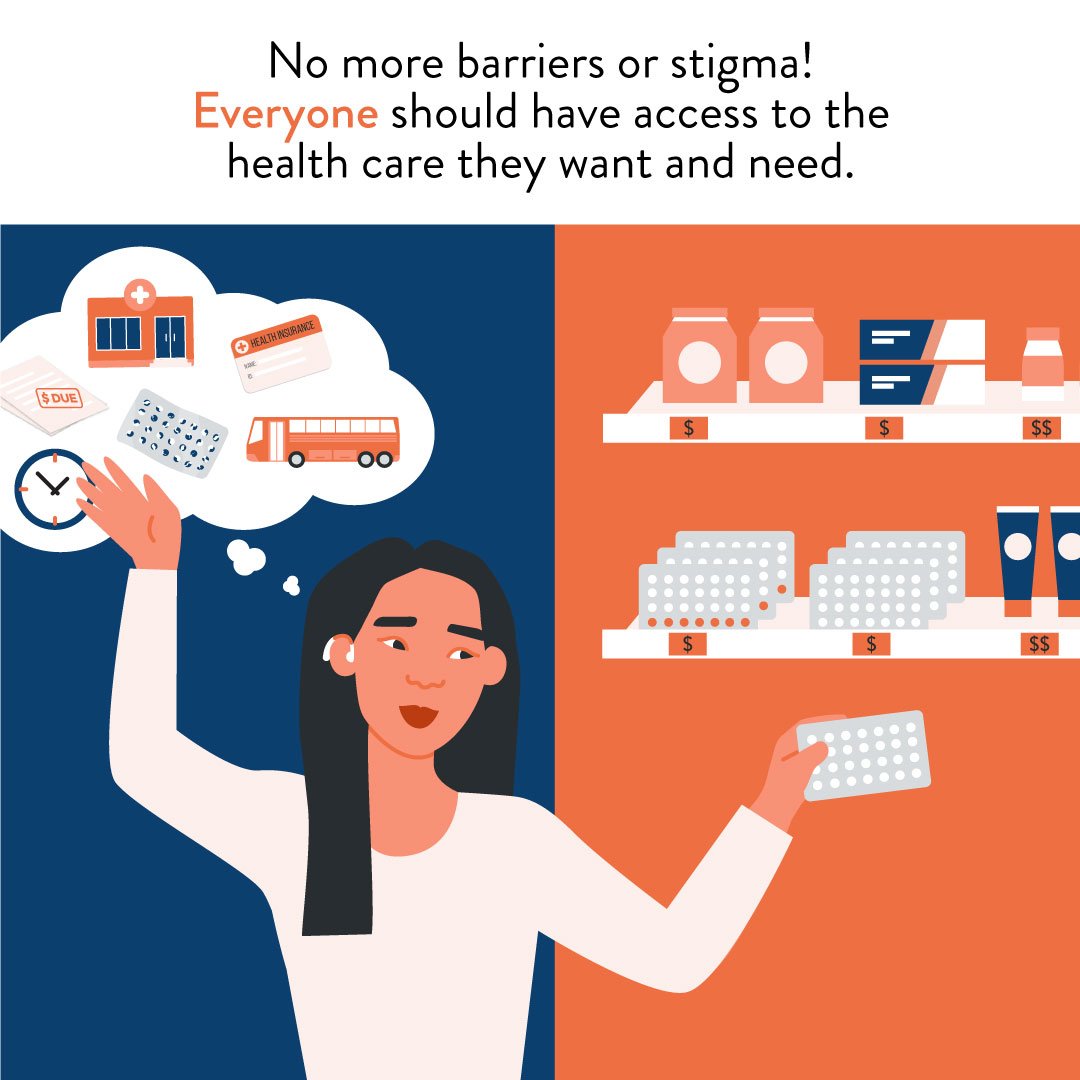Each of us should have the freedom to make decisions about our own bodies and lives with dignity and respect, free from barriers and stigma. Birth control pills are an important part of the full range of sexual and reproductive health care.
They’re also one of the best-studied medicines on the market today. But despite 60+ years of proven safety and effectiveness, people in the United States still face barriers to access.
Since 2004, a growing movement has been underway to make birth control pills more accessible by breaking down these barriers and building evidence and support for bringing birth control pills over the counter (OTC) in the United States.
About the Movement
What are the barriers to birth control pills?
Prescription requirement
Not having a regular health care provider
Time away from school or work to visit a provider
Limited hours of on-campus clinics
Transportation to a provider’s office
The cost of a provider visit
Lack of insurance coverage
Parental consent requirement
These barriers to birth control—and health care in general—are deeply rooted in systemic racism and other forms of discrimination and oppression.
Birth control pills are available OTC in countries all around the world!
In more than 100 countries, birth control pills are available OTC meaning you can get a pill pack right off the shelf. And with FDA approval of the first OTC birth control pill, Opill, the United States is FINALLY joining that list! Opill is expected to be available on shelves across the country in early 2024.
Our vision
We envision a future where...
Birth control pills are available OTC, fully covered by insurance, priced affordably, and accessible to people of all ages, backgrounds, and identities.
Our core principles
To build the evidence and support for the vision we seek—and ensure that no one is left behind—we apply three key principles to our work:
Reproductive justice
Reproductive justice means everyone—no matter who they are—has the freedom to maintain personal autonomy and make decisions that are right for their lives. A framework rooted in human rights, reproductive justice requires us to reckon with our country's oppressive history of laws and practices that by design have systemically impacted Black, Indigenous, Asian and Pacific Islander, and Latine/x communities, immigrants, people with disabilities, LGBTQ+ folks, and people working to make ends meet. Further, we must work to address the ongoing systems of oppression and commit to doing better.
Youth-adult partnerships
Centering young people and their perspectives is an essential part of informing research and policies that support affordability and access for all ages. In 2018, we officially launched a strategy in collaboration with Advocates for Youth to prioritize youth leadership in the movement and amplify their voices through our campaign. Young people now serve as leaders on our steering committee, providing input on decisions and informing strategies. In addition, each year a group of 13 youth activists from across the country serve on the #FreeThePill Youth Council and work in their communities to organize their peers in support of OTC birth control pills and other sexual and reproductive health topics.
Building power
We center the leadership and voices of those who face the greatest barriers to contraceptive care and would benefit most from easier access, including people of color and Indigenous peoples, young people, immigrants, people with disabilities, LGBTQ+ folks, and those working to make ends meet. Building power is how each of us gets the tools we need to create the reproductive lives we wish for ourselves and our communities. And it’s how we ensure the movement to free the pill advances the larger fight for true reproductive justice.
We know that OTC birth control pills will not erase the fraught history of the birth control pill or address the full scope of systemic barriers to access, but they can help break down some of the key structural barriers that too often keep access out of reach for so many communities. We need policy solutions that advance equitable access and reproductive justice!
Our core activities
Conducting and amplifying research to inform efforts to switch birth control pills from prescription status to OTC status
Supporting policies that ensure young people have equal access to OTC contraceptives
Advocating at the federal and state levels to expand public and private insurance coverage of OTC contraception without a prescription and ensure affordability
Ensuring measures are in place to guarantee OTC contraceptives are available on the shelf, and that an individual’s beliefs do not interfere with other people’s access
Engaging in regular convenings to build consensus on key issues in partnership with those who face the most barriers to access and will benefit most from OTC access
Engaging in public-facing opportunities to raise awareness and increase support, including through annual celebratory days: Free the Pill Day and World Contraception Day
Our coalition and campaign model
The movement to free the pill consists of two arms—the coalition and the campaign. The coalition is the driver of our work, a group of members leading the strategy for the vision we seek. And the campaign is the public face, the vehicle for raising awareness and increasing support for OTC birth control pills in the United States.
The coalition
Since 2004, a group of researchers, advocates, and providers has been leading a coalition-driven movement focused on the potential of OTC birth control pills to bridge gaps in access and give people greater control over their reproductive health and lives.
The campaign
Through public-facing activities, including digital actions, Free the Pill Day (May 9), World Contraception Day (September 26), webinars, and more, the campaign raises awareness and increases support for OTC birth control pills in the United States.






